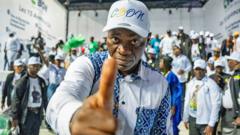After leading a coup against the long-standing Bongo dynasty, Brice Clotaire Oligui Nguema has emerged as a front-runner in Gabon's presidential race, promising a new political era. With national elections on the horizon, Oligui Nguema’s rise to power suggests a unique approach among African military leaders, who often resist democratic transitions. While he faces opposition, political support remains robust as the country hopes for modernization and efficient governance.
Gabon’s Coup Leader Aims for Democracy Amidst Military Trends in Africa

Gabon’s Coup Leader Aims for Democracy Amidst Military Trends in Africa
In a surprising political shift, Gabon's coup leader, Brice Oligui Nguema, prepares to embrace democracy following a peaceful takeover, contrasting with other military leaders clinging to power in Africa.
In just over 19 months since the 2023 coup that toppled the Bongo family's half-century rule, Gabon is set to conduct elections that reflect the public's desire for change. Brice Clotaire Oligui Nguema, the man behind that peaceful coup, has traded his military uniform for a politician's attire, becoming the favorite in an increasingly competitive race characterized by his overwhelming popularity.
Oligui Nguema, now 50, has positioned himself as a catalyst for change. He enjoys considerable backing from a populace eager to put an end to dynastic politics, aided in part by electoral regulations that have sidelined key competitors. His campaign slogan, "C'BON," cleverly plays on French, translating to "it's good," and resonates with a populace relieved to have moved past the previous regime.
His primary opponent, Alain-Claude Bilie-By-Nze, the last prime minister under deposed President Ali Bongo, represents a political lineage that many wish to leave behind. Should Oligui Nguema win, he will embark on a substantial seven-year term that could bring much-needed modernization and reform to the resource-rich nation of Gabon, which has a tense economic backdrop where over a third of its population lives in poverty.
The coup itself came swiftly following a discredited election that claimed Ali Bongo had won a third term with an implausible 64% of the vote. This escalation of discontent was catalyzed by Bongo's declining health and controversial political maneuvering, leading to a military intervention that has, so far, not been met with resistance. The resulting transition of power sparked celebrations among Gabon's citizens, who were tired of the dynastic rule.
Unlike military regimes in Mali or Guinea, Oligui Nguema has opted for engagement over repression. He has invited former officials, former adversaries, and civil society members into his transitional administration, signaling a break from the norm. He also has not resorted to the crackdowns seen in other regions, positioning Gabon as an anomaly in a landscape where military takeovers have frequently ended in authoritarianism.
Oligui Nguema’s government has maintained friendly relations with France and seeks to bolster international ties—particularly as it eyes a restoration of civilian governance. His administration is investing in public infrastructure and has begun financing efforts to stimulate development amidst social pressures.
However, challenges loom larger on the horizon. Should he gain the presidency, Oligui Nguema will bear the weight of public expectations as the slow but inevitably demanding restoration of democracy unfolds. Cooperation with civil society figures and addressing the economic needs of Gabon's urban and rural populations will be pivotal. Gabon’s ecological initiatives, conservation ambitions, and the balancing of indigenous rights will further complicate governance in an environment where demands for accountability and progress intensify.
As a significant oil producer and exporter, Gabon has the means for reform, but whether Oligui Nguema can transform popular support into tangible governance success remains to be seen. With the election approaching, the world watches closely, hoping for a definitive shift in the political landscape of Central Africa.



















